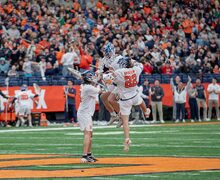Overcome obstacles to voting, cast mid-term election ballot
Two years from now, on the first Tuesday following the first Monday of November 2008, the country will be pulsating with the anticipation of electing a new president. Many Americans will cast a ballot, paying their tribute to democracy. But that is 725 days away. The opportunity to make a real difference lies in voting tomorrow.
It is understandably difficult for students living on campus to cast their vote. Most students live outside of their home district and the drive home in the middle of the week does not seem appealing. While absentee ballots are a perfect fit for a lot of student’s situations, the hassle and paperwork can often end up overcoming the good intention.
In the 2002 mid-term election, 19.3 percent of 18 to 24 year old citizens voted, while 60.5 percent of bachelor-degree recipients made it to the polls, according to the U.S. Census Bureau. These polar opposites put the academic crowd at two distant ends of the spectrum.
A college education makes a person more likely to vote, but ‘youth and distance are handicaps,’ said Professor Robert McClure of the Maxwell School of Citizenship and Public Affairs. A campaign manager would be ill-advised to rely on college-aged voters, said McClure.
Something feels different about tomorrow’s elections. Forty years ago 78.8 percent of registered voters participated in the mid-term, while two years ago participation was 69.4 percent, according to the U.S. Census Bureau. This decline may be due to a growing disinterest and increasing frustration with politics. But one glance at TV this week yields the tense atmosphere and cutthroat competition of the 2006 pool. Only time will tell if these factors can translate into greater turnout.
‘It’s hard to imagine that these mid-terms will be normal,’ said McClure, ‘Democrats are energized to vote.’
Democrats are confident high turnout can secure their party the House of Representatives and possibly earn them control of the Senate. While Democrats are energized, college students don’t appear as engulfed as the rest of the nation. I find most students don’t relate to the world of D.C. politics.
The party factor is not a compelling motivator chiefly because few political issues affect the daily lives of your standard 20-year-old. According to an unofficial Facebook poll, the number one campaign issue for students is lowering the drinking age. Hardly a position either party advocates.
‘Don’t buy the presumption that college students are overwhelmingly liberal,’ said McClure, who finds that young people’s ideology follows the political landscape.
Unfortunately the overarching social ideology appears to be apathy. And if that is reflected in tomorrow’s turnout numbers, the essential relationship between those who govern and the governed will depreciate a little bit more. Leaders and analysts will be disappointed but the most damaging consequence of apathy is that the politicians will stop listening.
If students feel left out of government, mid-term elections are an appropriate entry point. It is at the legislative level where many decisions directed at our age group are made. Take the time tomorrow to vote and magnify your views.
Remind the Washington policymakers they answer to the college population too.
Matt Reilly is a featured columnist whose columns appear Mondays in The Daily Orange. E-mail him at msreilly@syr.edu.
Published on November 5, 2006 at 12:00 pm





